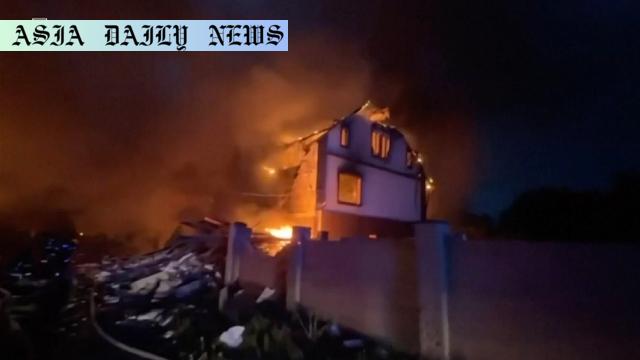Ukraine: At least 12 dead after 2nd night of Russian air strikes

Introduction to Recent Russian Air Strikes in Ukraine
In the latest escalation of the war in Ukraine, Russian forces launched an aggressive aerial campaign for the second consecutive night, resulting in significant casualties and destruction. At least 12 people lost their lives in a brutal assault that targeted various Ukrainian regions. Among the deceased were three children, deaths that have shaken the local and international communities. According to the Ukrainian military, the attacks comprised a devastating combination of 298 drones and 69 missiles aimed at urban centers and residential areas. The scope and magnitude of the attack underscore what officials have described as the largest aerial strike by Russia since the conflict began.
Details of the Devastating Attack
The overnight offensive wreaked havoc across multiple regions in Ukraine. Emergency services reported that the Kyiv region was particularly affected, with four casualties. In the western region of Khmelnytskyi, another four individuals lost their lives. The unsettling detail that three children perished in the northwestern Zhytomyr region has amplified the tragedy. Residents of the capital city Kyiv were forced to flee to metro stations, using them as makeshift bomb shelters. Reports confirm that 11 people in Kyiv suffered injuries, adding to the human toll of this night of terror. Meanwhile, Ukrainian authorities are working tirelessly to provide aid, support, and evacuation assistance to affected areas.
The Broader Implications of Russia’s Escalation
This wave of air strikes has brought renewed focus on the ongoing war and its far-reaching human and political consequences. Ukrainian President Volodymyr Zelenskyy strongly condemned these attacks on social media, asserting that Russia is “dragging out this war and continues to kill every day.” The President also issued a stark warning that global inaction or muted responses to these air strikes could embolden Russia further. Zelenskyy implored nations like the United States and allied countries to impose stronger measures and put relentless pressure on the Russian leadership. He emphasized that without collective international advocacy and intervention, this cycle of violence risks becoming endless.
Global Reactions and Urgency for Diplomatic Action
The sheer scale of the overnight bombardment has drawn strong reactions globally. Prominent advocacy organizations, government officials, and news agencies, including Reuters, have highlighted the brutality of the attack, describing it as unprecedented in intensity since Russia’s invasion began. Many global leaders are being called upon to reconsider their diplomatic, economic, and military engagements. The unwavering silence or slow responses, Zelenskyy suggested, reduce global accountability and encourage acts of violence perpetrated under the watchful eyes of the global community. This comprehensive aerial assault has ignited a renewed call for urgent global action toward lasting peace and security in the region.
The Humanitarian Toll and Calls for Relief
Beyond the immediate casualties, the attack has devastating long-term humanitarian implications. Displacement, trauma, and the destruction of infrastructure continue to burden Ukrainian citizens, many of whom have been living under the shadow of war. Relief organizations are struggling to keep up with the magnitude of the crisis as resources become scarce and aid corridors come under threat. As winter draws closer, the need for shelter, medical support, and food supplies becomes increasingly urgent, particularly in regions ravaged by the latest air strikes. The international community must play a decisive role in ensuring that humanitarian aid reaches those in need.
Conclusion
The Russian air strikes on Ukraine represent a grave escalation in an already devastating conflict. The staggering loss of life, coupled with the targeting of civilian areas, underscores the urgent need for decisive action. While Ukraine continues to defend its sovereignty and citizens, the international community must unify to hold aggressors accountable and alleviate the suffering of those caught in the crossfire. As history unfolds, the global response to these events will undoubtedly shape the trajectory of this conflict and its broader implications for international peace and security.
Commentary
The Persistence of Tragedy in Ukraine
The recent air strikes on Ukraine are not just another headline; they are a stark reminder of the ongoing human tragedy in the region. What makes this incident particularly harrowing is the loss of innocent lives, including children, who symbolize the devastating human cost of war. As I read about families fleeing to metro stations and communities mourning their lost loved ones, the reality of this conflict hits harder. The persistence of such attacks raises an important question: how long can the world afford to look away from the suffering of ordinary people whose lives have been turned upside down?
The Need for Strong Global Leadership
President Zelenskyy’s remarks about the silence of global powers like the United States highlight a grim truth about international politics. Meaningful change requires strong action, especially when innocent lives are at stake. While sanctions and condemnations have been issued against Russia, one wonders whether these measures are enough to deter continued aggression. Zelenskyy’s plea for unified and robust global leadership is a wake-up call. Countries with influence must evaluate their role in promoting peace and stability and acknowledge the ripple effects of their decisions—or their hesitations—on the ground.
Lessons for Humanity
At the heart of this story lies a powerful lesson for humanity: inaction equates to complicity. We cannot remain passive observers when innocent lives are taken daily. The death of any child, anywhere, is a tragedy that demands universal outrage and action. As a global community, we must transcend political divides and work collectively to ensure that families like those in Ukraine no longer have to shelter underground in fear. Only through solidarity, resilience, and collective will can peace become a reality for those who have endured too much for too long.


